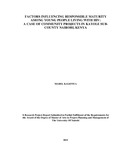| dc.description.abstract | This project report sought to examine social and behavioural factors influencing responsible maturity among young people living with HIV in Kayole Sub County, Nairobi County. Most young people living with HIV experience challenges of transitioning to adulthood with HIV. The major factors influencing this trend have not been clearly understood. Consequently, this limits the ability of project implementers and other stakeholders to develop appropriate strategies address the problem. The objectives of the study were to investigate the extent to which HIV information, social structures, self-identity and personal choices influence responsible maturity among young people living with HIV. Research questions were formulated around the four objectives to guide the study. The target population for this study consisted of 139 Young People Living with HIV with a sample size of 45 young people living with HIV taken for the study. The research used simple random sampling in selecting the key respondents and a descriptive survey design. Data was collected using structured questionnaires and Statistical package for social sciences used to analyse data that was then presented in frequency tables and percentages. Specifically findings on the dependent variable on the extent to which social and behavioural factors influence responsible maturity among young people living with HIV indicated that Majority 35 (70%) strongly agreed, few 15 (30%) disagreed that social and behavioural factors influence responsible maturity among young people living with HIV. From these findings HIV information, social structures, a strong self-identity and informed personal choices were found to be equally important in enabling responsible maturity with HIV. The research concluded that a strong self-identity is the most dominant variable of responsible maturity with HIV with the highest mean of 4.100 and lowest standard deviation of 1.035. Recommendations drawn from the analysed data will support young people living with HIV to develop HIV information seeking and utilisation behaviour; link with structural support to optimise social assistance and enhance their integration into the society; develop a strong self-identity to boost their sense of belonging; make informed personal choices during the critical stage of progressing to maturity. Community based projects may use the findings to alter projects to implement youth friendly services that cover these social and behavioural aspects achieve responsible maturity with HIV among young people. Recommendations drawn from the analysed data should be improved, and used to make adjustments on community based projects. The findings may be used as a basis for further research with the aim of improving community based response. Relevant development agencies may adopt the findings of the study. | en_US |

